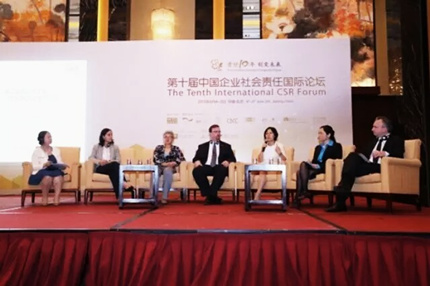【Event】What’s in for Chinese Suppliers – Towards creating more value together
2015-08-07未知admin0010

On June 5, 2015, econsense (Forum for Sustainable Development of German Business), China WTO Tribune and the Emerging Market Multinationals Network for Sustainability (implemented by GIZ) jointly organized The Second Responsible, Sustainable and Successful Supply Chain Workshop. This year’s workshop focused on responsible and sustainable supply chain relations with a particular focus on “what’s in for suppliers” and presented best practices on how to work with suppliers to create more value together.
“87% of our suppliers receive certifications. Last year, more than 50,000 suppliers sent us sustainable questionnaire and 70% of our suppliers used the e-learning tools,” Prof. Dr. Gerhard Prätorius, Head of Sustainability and Political Communication of Volkswagen thought that these data show the sustainable supply chain relations. He said, we should work with leading suppliers and furthermore, should develop more in-depth relationship with every supplier and partner.
Siemens set an example for localized supply chain management by taking local law into account and inviting suppliers and partners work together to realize sustainable development. Ms. Qiying Cai , Head of Procurement/SCM of Siemens & Supplier said that Siemens established the IPE blacklist database to check supplier qualification on earlier supplier environmental performance.
Ms. Candice Fan from the Linde Group introduced the key points concerning supplier management. She said, “We will conduct document review, questionnaire, self-assessment on enterprise risk factors. We will review and discuss the potential value and risk, and encourage supplier to come up with risk mitigation plan. They are required to improve their business standard procedure in reference to Business Continuity Plans.”
BASF “1+3” CSR Project in supply chain in China has become a guiding post in building responsible supply chain. Mr. Victor Zhang, Director of Procurement Greater China of BASF told the audience BASF’s latest development on this project: they cooperate with East China University of Science and Technology to conduct training on sustainable development for suppliers, aiming to cover all Chinese suppliers in five years.
Suppliers’ CSR partnership with MNCs needs investing money and energy to deal with related issues and finally they will benefit from CSR partnerships with MNCs.
“A year ago, Deutsche Telekom told us that if Fingu join in CSR project, it would gain economic benefit. I doubted what they said and only saw what we will invest.” Ms. Shunhua Li from Wuhan Fingu Electronic Technology Co., Ltd said. But one year later, the performance of Fingu after its CSR partnerships with Deutsche Telekom reassures her. Fingu has reduced turnover rate by cutting overtime hours, ensuring employee safety and improving their living environment, and further reduced the cost and increased productivity.
Ms. Lu Ying, Head of Procurement China of Bayer Healthcare Company Ltd., believed the partnership with suppliers can explore win-win solutions. Bayer once produced a medicine package with complex folding patterns. After negotiation with suppliers to make change, the new package was welcomed by doctors and nurses and it also reduced production costs. Lu said, “This is a win-win solution and we also improved our partnership in the process.”
The Second Responsible, Sustainable and Successful Supply Chain Workshop is one of parallel panel of the 10th International CSR Forum and the Award Ceremony of “2014 GoldenBee CSR China Honor Roll”, which was hosted by China WTO Tribune, co-hosted by CSR Europe, GIZ, CBCC, SHRM,econsense, Embassy of Sweden in Beijing and Business Social Compliance Initiative (BSCI)–Foreign Trade Association (FTA) and supported by GoldenBee Management Consulting.
Best Practices
- The 100-year brand — Air Liquide also has a sense of juvenile
- Beijing Public Transportation Corporation: Developing green transportation to build a harmonious and livable capital
- CGN: Building a modern factory in barren deserts and developing a new win-win cooperation model along “Belt and Road”
Upcoming Event

All the materials on the site “Source: XXX (not from this site)” have been reprinted from other media. They do not imply the agreement by the site.
All the materials with “Source: CSR-China Website” are the copyright of CSR-China Website. None of them may be used in any form or by any means without permission from CSR-China Website.
GoldenBee Official WeChat
Copyright © Csr-china.net All Right Reserved.
京ICP备13041808号-3










